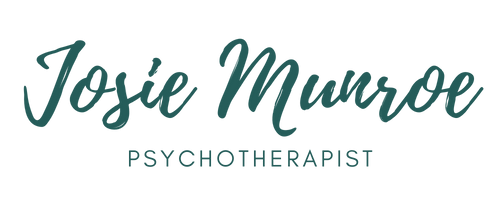Overthinking, Overwhelmed, and Over It: How to Break Free
Understanding the cycle so that you can get out of and get on with life.
Maybe you've heard eating disorder recovery described as thousands of small choices made every day. Well, speaking from experience, this is not an exaggeration. The decisions seem never-ending, and they can leave your mind tangled in a web of overthinking and teetering on the edge of overwhelm-shutdown-mode. Because of our depth of processing, Highly Sensitive People are particularly susceptible to this.
Overthinking intensifies our worst fears and insecurities, resulting in a cycle that feels impossible to escape. But you absolutely can. In this post, I've got some strategies to help you better understand the cycle, break free from it, and keep yourself from throwing in the towel.
Understanding the F*ck It Cycle
Overthinking that occurs in eating disorders can manifest in a variety of ways; there's over-analyzing every single meal and snack choice, obsessively counting and tracking calories, replaying perceived mistakes, and desperately calculating compensation techniques. This doesn't just drain your mental energy, but it also drowns out the voice of your healthy, true Self that offers you encouragement and gently nudges you toward the next right thing.
Becoming overwhelmed by this non-stop brain chatter can feel inevitable.
Consequently, you may find yourself in a cycle of frustration, inaction, and a nasty case of The F*ck It's.
Here's what it looks like altogether:
The naturally challenging circumstances of recovery ➡️ overthinking ➡️ feeling overwhelmed ➡️ giving up ➡️ slips, lapses, and relapses.
Becoming aware of this pattern and how it affects you lays the groundwork for change. If you look at the chain above, what do you think is the earliest point where you could make an effective change?
If you guessed overthinking, you're right. Bringing more awareness to your thought processes and learning how to shift out of disordered thinking is KEY to breaking the pattern.
Working With An Overactive Mind
During eating disorder recovery, overthinking often revolves around deep-seated fears of failure and making wrong decisions. It's not a personal failure that you deal with these persistent thoughts. Your mind has developed this protective tendency in an attempt to feel safe and gain a sense of control in a chaotic and unpredictable environment. (If you're Highly Sensitive, that's the whole world in general, right?)
Fear of doing the wrong thing occurs on two fronts when you're in recovery, making it that much more difficult:
Your brain is simultaneously concerned about doing the wrong thing according to
your
eating disorder and also doing the wrong thing according to
your recovery.
This is part of why giving up on recovery can feel so alluring during the challenging moments - you can be tempted to reduce the amount of overthinking by focusing solely on the eating disorder's desires.
Common cognitive patterns that can screw with you include: creating elaborate "what if" narratives, catastrophizing, and engaging in negative self-talk. The following tools can help you begin to separate yourself from these thoughts, understanding that they are experiences passing through your mind, not absolute truths. Like that popular bumper sticker warns, "Don't believe everything you think."
Cognitive Defusion:
If you've followed my blog for a while, you know I love this one. Cognitive Defusion helps you gain distance from your thoughts by adding short phrases to the beginning, such as "I am having the thought that..." and "I notice that I am thinking that..." Read more about this tool in my post, A Simple Tool for Intrusive Eating Disorder Recovery.
Journaling:
This is a great outlet for overthinking. By writing down your thoughts, journaling also helps give you some distance and a tangible narrative. It helps you identify patterns in your thoughts that lead to triggers and can also highlight your progress, reminding you of just how far you've come.
Dialoguing:
Write out a dialogue (much like you'd see in a script) between your Eating Disorder-Voice and your Recovery-Voice. Go back and forth responding to your eating disorder's thoughts as you would those of a scared friend. This strengthens the recovery muscle and lets you gain distance from overthinking. Be sure to end with your Recovery Voice getting the last word. 😉
Use Community:
Sharing your struggles with others is a powerful antidote to the isolation of overthinking and can help combat the effects of overwhelm. Talk to a therapist, join a support group, or confide in a trusted loved one. Often, simply verbalizing what's going on up there can help you find clarity and move through the stickiness.
Getting Up Instead of Giving Up: Reigniting Your Motivation in Recovery
The desire to give up is an incredibly frequent and common experience in eating disorder recovery, especially in earlier stages when progress feels slow and setbacks occur. Remember, every struggle in your recovery is an opportunity to learn and grow. It’s important to acknowledge feelings of frustration, discouragement, AND overwhelm without judgment.
One of the most powerful ways to combat the urge to throw your hands in the air is to reconnect with your "why." Why did you choose recovery in the first place? Write down your reasons, whether it’s wanting to have more energy, mend your relationships, or simply because you want to live a life free from obsessive thoughts about food. Return to these reasons whenever motivation wanes.
Breaking free from the cycle of overthinking-overwhelmed-and-over it in eating disorder recovery is a doable process that requires patience and self-compassion.
Celebrate your victories, no matter how small they may seem. Each step forward, each challenge overcome, is a testament to your strength and commitment to healing. You are capable of fully recovering and reclaiming your life.
Keep going, warrior. 💕




